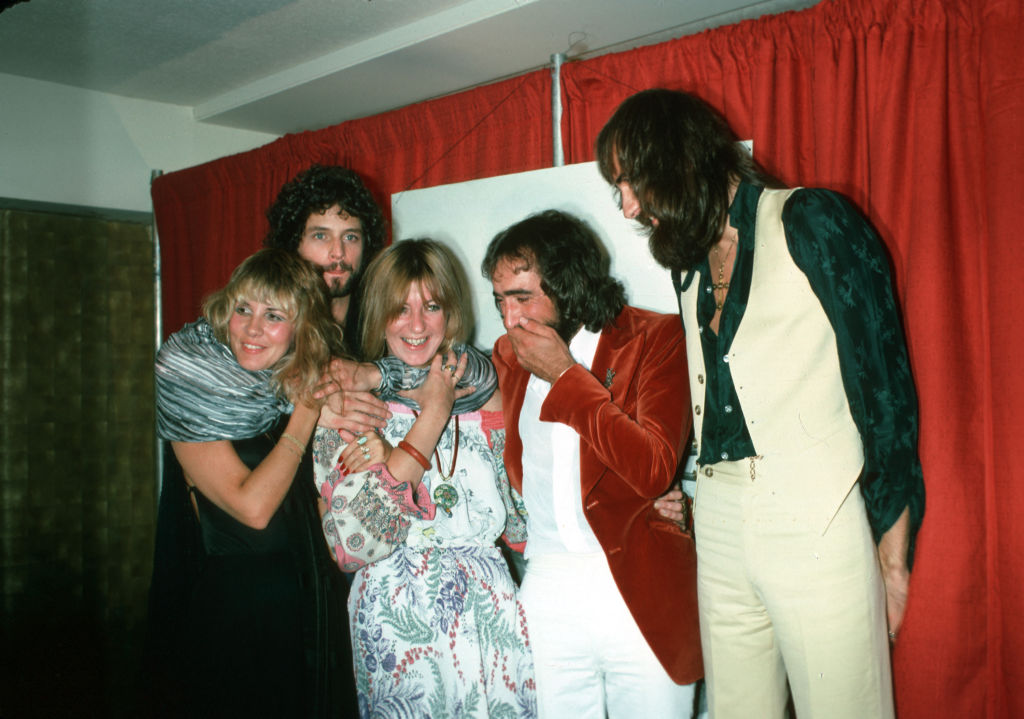Before Rumours hit the shelves in 1977, Fleetwood Mac had morphed from a British blues ensemble into a transatlantic rock sensation. This transformation culminated in their iconic 1975 lineup, paving the way for the Rumours masterpiece two years later.
The title ‘Rumours’ was initially suggested by bassist John McVie, who felt the bands’ members were writing ‘journals and diaries’ about each other through their music. Indeed, relationship turmoil was the primary motivation behind much of the records’ lyrics. In fact, the only member of the five-person lineup not (yet) involved in intra-band relations was de facto leader and percussionist Mick Fleetwood, who himself remained entangled in a domestic love triangle which had seen former Mac guitarist Bob Weston fired from the band four years earlier. The other four members comprise two couples, John and Christine McVie and Lindsey Buckingham and Stevie Nicks.
The McVies had been married for eight years before separating mid-tour in 1976, sparking Christine to pen several relationship-inspired tracks. The pair had remained in an obstinate silence following the split, communicating only on absolutely necessary musical matters. Thus, much of the talking was done through Rumours’ lyrics. Most notably, ‘Don’t Stop’ was a statement on the vocalist’s feelings following the break-up, signalling she had come to terms with and moved past the situation.
This was all the more evident in that she had begun dating the band’s lighting engineer, Curry Grant, for whom she wrote ‘You Make Loving Fun,’ a song on which her former spouse was resigned to play bass guitar during all subsequent tours.
‘Oh Daddy,’ a further product of Christine McVie’s writing, was proclaimed by McVie to have been about Mick Fleetwood’s aforementioned split from 60s model Jenny Boyd following her affair. Other band members have since questioned the claim’s validity, believing it to be a further ode to her new lover, the tale of the track being Mick Fleetwood-inspired a retrospective fallacy. Regardless of McVie’s true motivations, it became a further song off the record to be born out of the personal affairs of the band’s members.
Lindsey Buckingham and Stevie Nicks were having relationship problems of their own. By the time they got to recording Rumours, they were all but separated, living apart and vicariously reconciling their failed relationship through their music. ‘Second Hand News’ was Buckingham’s tongue-in-cheek opener directed at his former partner, whilst Nicks’ ‘Dreams’ would go on to become the band’s most successful release. It was a sanguine anthem representing the band’s overall resilience during the time of turmoil.

Yet if ‘Dreams’ was the more gentle and philosophical side of the record, Buckingham’s ‘Go Your Own Way’ was the angry and revengeful reply from his perspective of the relationship, featuring the lyrics: “Packin’ up, shackin’ up is all you wanna do.”
Nicks would go on to say that “every time those words would come onstage”, she wanted “to go over and kill him,” as Buckingham knew the accusation was false and was just trying to make her suffer for leaving him. Of course, Nicks had the same exact desire with her equally bitter ‘Silver Springs,’ a song that was later axed from the tracklist, creating more drama in and of itself. Due to the band’s desire for equal representation and being tied by vinyl pressings, it was replaced by ‘I Don’t Want To Know,’ an upbeat and conciliatory Buckingham-Nicks duet about the end of a relationship.
READ MORE: ★★★☆☆ Daisy Jones and the Six review | Sounds like the seventies, smells like teen drama
‘Silver Springs’ was eventually, and fittingly, released as a B-Side to ‘Go Your Own Way,’ the title coming from Nick’s romanticisation of the Maryland town’s name, symbolising what Buckingham could have been to her. ‘Silver Springs’ featured digs such as “The sound of my voice will haunt you”, which became the song that gave us perhaps the most iconic live Fleetwood Mac moment in their performance at Warner Bros. Studios in 1997. Nicks would sing the entire final minute hyper-fixated on Buckingham, slowly walking towards him, a fitting illustration of the pair’s timeless broken bond.
Both of these crumbling relationships, along with reports of heavy drug use due to production taking place in the centre of Sausolito’s hippie community, led to an awkward yet astounding recording process. The group rarely socialised outside of working hours, would only work when they were finally tired from nights of debauchery, and would send not-so-subliminal messages through songs that the recipients would then have to play and sing on. Yet the process worked. Rumours went number 1 on the Billboard Top 100, remaining there for 31 weeks, and would later become the 9th best-selling album of all time.

Indeed, Pitchfork has described Rumours as “a flawless record pulled from the wreckage of real lives,” an apt description of the immense, intense and emotional release that emerged from the extremities of heartbreak and betrayal each bandmate suffered. It is only fitting that the record’s most famous lyrics reflect this: “Thunder only happens when it’s raining.”
Top image: Fleetwood Mac wins the Album of the Year award at the 20th Grammy Awards at the Shrine Auditorium. Left to right producer Richard Dashut, Stevie Nicks, Lindsey Buckingham, Mick Fleetwood, Christine McVie and John McVie on February 23, 1978, in Los Angeles, California. (Photo by Michael Ochs Archives/Getty Images)
Keep up to date with the best in UK music by following us on Instagram: @whynowworld and on Twitter/X: @whynowworld





